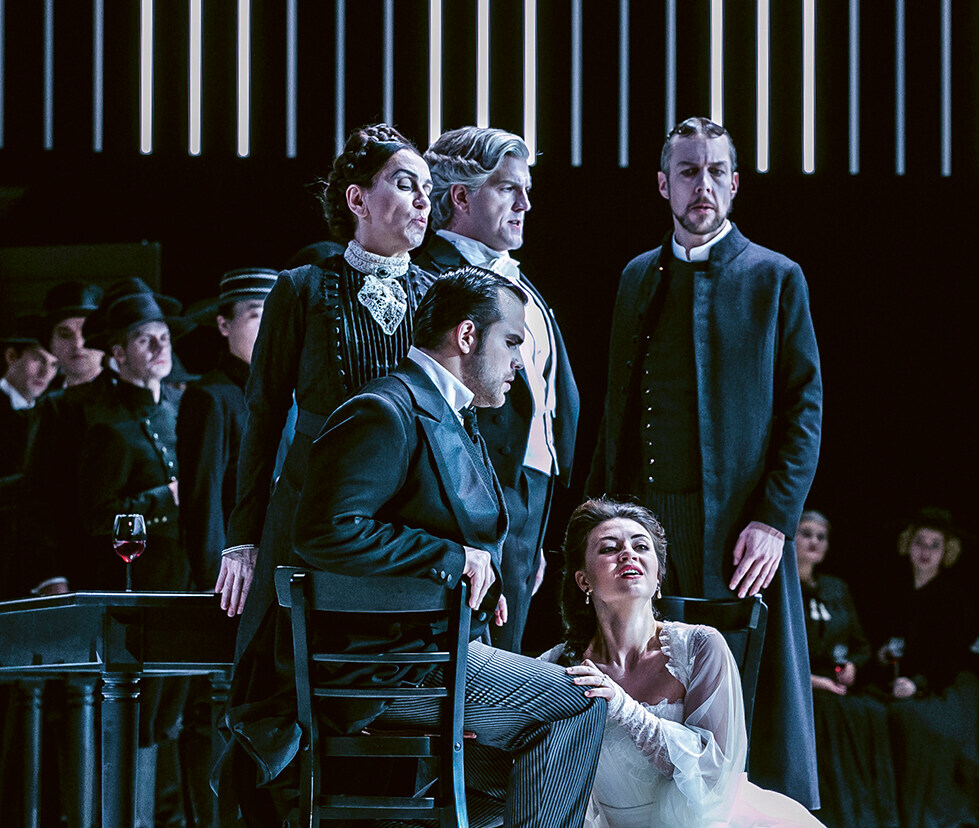The world’s greatest love story wrapped in enchanting melodies and moving choruses.
Opera in five acts
Libretto by Jules Barbier and Michel Carré based on the play of the same name by William Shakespeare
Performed in French with German and English supertitles
Premiere
3. May 2025
Dates & Cast
- Conductor Robert Jindra
- Staging Barbara Wysocka
- Set Design Barbara Hanicka
- Costume Design Julia Kornacka
- Lighting Design Fabio Antoci
- Choir Jan Hoffmann
- Dramaturgy Benedikt Stampfli
- Juliette Tuuli Takala
- Gertrude Michal Doron (03., 06., 09., 16., 25. May, 08. June 2025), Claude Eichenberger (29. May, 04. June 2025)
- Tybalt Brian Michael Moore
- Pâris Gerrit Illenberger
- Capulet Oleksandr Pushniak
- Gregorio Anton Beliaev
- Roméo Liparit Avetisyan
- Stephano Valerie Eickhoff
- Benvolio Jongwoo Hong
- Mercutio Danylo Matviienko
- Frère Laurent Georg Zeppenfeld
- Le Duc de Vérone Tilmann Rönnebeck
- Conductor Robert Jindra
- Staging Barbara Wysocka
- Set Design Barbara Hanicka
- Costume Design Julia Kornacka
- Lighting Design Fabio Antoci
- Choir Jan Hoffmann
- Dramaturgy Benedikt Stampfli
- Juliette Tuuli Takala
- Gertrude Michal Doron
- Tybalt Brian Michael Moore
- Pâris Gerrit Illenberger
- Capulet Oleksandr Pushniak
- Gregorio Anton Beliaev
- Roméo Liparit Avetisyan
- Stephano Valerie Eickhoff
- Benvolio Jongwoo Hong
- Mercutio Danylo Matviienko
- Frère Laurent Georg Zeppenfeld
- Le Duc de Vérone Tilmann Rönnebeck
- Conductor Robert Jindra
- Staging Barbara Wysocka
- Set Design Barbara Hanicka
- Costume Design Julia Kornacka
- Lighting Design Fabio Antoci
- Choir Jan Hoffmann
- Dramaturgy Benedikt Stampfli
- Juliette Tuuli Takala
- Gertrude Michal Doron
- Tybalt Brian Michael Moore
- Pâris Gerrit Illenberger
- Capulet Oleksandr Pushniak
- Gregorio Anton Beliaev
- Roméo Liparit Avetisyan
- Stephano Valerie Eickhoff
- Benvolio Jongwoo Hong
- Mercutio Danylo Matviienko
- Frère Laurent Georg Zeppenfeld
- Le Duc de Vérone Tilmann Rönnebeck
- Conductor Robert Jindra
- Staging Barbara Wysocka
- Set Design Barbara Hanicka
- Costume Design Julia Kornacka
- Lighting Design Fabio Antoci
- Choir Jan Hoffmann
- Dramaturgy Benedikt Stampfli
- Juliette Tuuli Takala
- Gertrude Michal Doron
- Tybalt Brian Michael Moore
- Pâris Gerrit Illenberger
- Capulet Oleksandr Pushniak
- Gregorio Anton Beliaev
- Roméo Liparit Avetisyan
- Stephano Valerie Eickhoff
- Benvolio Jongwoo Hong
- Mercutio Danylo Matviienko
- Frère Laurent Georg Zeppenfeld
- Le Duc de Vérone Tilmann Rönnebeck
- Conductor Robert Jindra
- Staging Barbara Wysocka
- Set Design Barbara Hanicka
- Costume Design Julia Kornacka
- Lighting Design Fabio Antoci
- Choir Jan Hoffmann
- Dramaturgy Benedikt Stampfli
- Juliette Tuuli Takala
- Gertrude Michal Doron
- Tybalt Brian Michael Moore
- Pâris Gerrit Illenberger
- Capulet Oleksandr Pushniak
- Gregorio Anton Beliaev
- Roméo Liparit Avetisyan
- Stephano Valerie Eickhoff
- Benvolio Jongwoo Hong
- Mercutio Danylo Matviienko
- Frère Laurent Georg Zeppenfeld
- Le Duc de Vérone Tilmann Rönnebeck
- Conductor Robert Jindra
- Staging Barbara Wysocka
- Set Design Barbara Hanicka
- Costume Design Julia Kornacka
- Lighting Design Fabio Antoci
- Choir Jan Hoffmann
- Dramaturgy Benedikt Stampfli
- Juliette Tuuli Takala
- Gertrude Michal Doron
- Tybalt Brian Michael Moore
- Pâris Gerrit Illenberger
- Capulet Oleksandr Pushniak
- Gregorio Anton Beliaev
- Roméo Liparit Avetisyan
- Stephano Valerie Eickhoff
- Benvolio Jongwoo Hong
- Mercutio Danylo Matviienko
- Frère Laurent Georg Zeppenfeld
- Le Duc de Vérone Tilmann Rönnebeck
- Conductor Robert Jindra
- Staging Barbara Wysocka
- Set Design Barbara Hanicka
- Costume Design Julia Kornacka
- Lighting Design Fabio Antoci
- Choir Jan Hoffmann
- Dramaturgy Benedikt Stampfli
- Juliette Tuuli Takala
- Gertrude Claude Eichenberger
- Tybalt Brian Michael Moore
- Pâris Gerrit Illenberger
- Capulet Oleksandr Pushniak
- Gregorio Anton Beliaev
- Roméo Liparit Avetisyan
- Stephano Valerie Eickhoff
- Benvolio Jongwoo Hong
- Mercutio Danylo Matviienko
- Frère Laurent Georg Zeppenfeld
- Le Duc de Vérone Tilmann Rönnebeck
In brief
Who doesn’t know the heart-breaking story of the young couple from Mantua? Two people from feuding families who love each other so much that, after flouting tradition and their rigid family structures, they have the courage to pay for this outrage with death. Romeo and Juliet want to do more than just break the rules – they wish to love and to live freely. The version of William Shakespeare’s play, published in 1597, has been adapted many times for theatre, ballet, film, musicals and opera, including „Roméo et Juliette“ by Charles Gounod.
One of the foremost composers and organists of the 19th century, the Frenchman wrote numerous sacred works, in particular for the organ, as well as a large number of operas, of which Faust (based on Goethe’s play) and „Roméo et Juliette“ are still hugely popular today. The premiere of the latter took place in Paris in 1867 at the time of the World Exhibition, which certainly helped cement the work’s fame; with its enchanting melodies and moving choral passages, the opera was soon being performed throughout the world. The first performance in Germany, at Dresden’s Royal Court Theatre, came only six months after the premiere. To this day, this much-loved classic opera is a firm fixture in the repertoires of opera houses around the world.
Storyline
Prologue
The people of Verona deplore the endless war between the feuding Montague and Capulet families and tell the story of the fate of Romeo and Juliet.
Act I
At the Capulets’ masked ball, Romeo and his friend Mercutio from the Montague family show up. At a moment when Juliet, the daughter of the head of the Capulets who is promised to Paris, is unattended, she is approached by Romeo. Immediately, the flame of love is kindled between the two. When Juliet’s cousin Tybalt confronts the foreign intruder, Juliet’s father steps in and calms the situation.
Act II
In the shelter of the night Romeo visits Juliet. In her room, they confess their boundless love for each other and Juliet asks Romeo to marry her.
Act III
Romeo confides to Friar Laurence his love for Juliet. After Juliet appears with her nurse Gertrude, the cleric agrees to marry the two lovers.
In search of his friend Romeo, Romeo’s Page, Stephano, provokes the Capulets. Gregorio and Stephano fight each other and Mercutio immediately intervenes. Tybalt challenges Mercutio to a duel. When Romeo appears, he fails to appease the two, and in the fight Mercutio is killed by Tybalt. Romeo avenges his death and stabs Tybalt. The situation only calms down when the Doge of Verona hurries to the scene and calls for peace. Romeo is banished by him from the city.
Act IV
Nevertheless, Romeo spends the night with Juliet. After Romeo flees at dawn, Juliet’s father, followed by Friar Laurence, comes to her room and presses her to marry Paris. After her father leaves, she asks the cleric to help her. He gives her a potion that will put her into a death-like sleep. She drinks it.
When her father returns to take her to the planned wedding with Paris, she collapses, lifeless.
Act V
Although Friar Laurence wrote a letter to Romeo to inform him that Juliet had only drunk a narcotic, it never arrived. So at Juliet’s grave he believes that she is dead, kisses her one last time and drinks poison. At that moment Juliet wakes up to find that her bridegroom is dying and stabs herself with a dagger. In their final moments, they ask for God’s grace.

